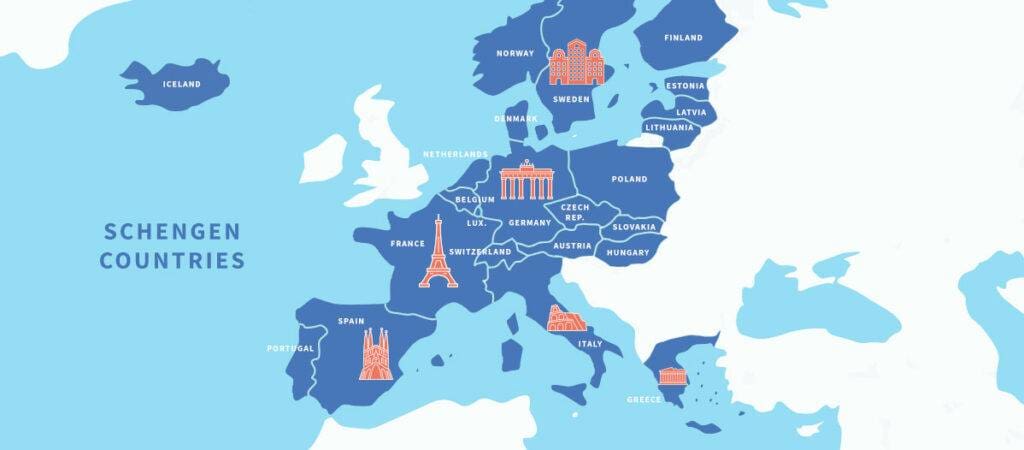
A simple guide to the 90/180 rule
The infamous 90/180 rule has been misunderstood from the start. That’s perhaps because it sounds so simple, but in reality it foxes everybody.
As a non-EU passport holder, you are allowed to visit France visa-free for 90 days out of 180 days.
The confusion starts with how exactly that is calculated.
Most people naturally assume that you arrive, stay for 90 days, leave, wait 90 days then come back again. But that’s not how it works. It’s more complicated – but much fairer- than that.
For a start, the rule doesn’t just apply to France. It applies to any of the 27 participating countries in the Schengen area.
TIP: 27 Schengen countries participate in the 90/180 rule, but 5 do not.
Time spent in Bulgaria, Croatia, Cyprus, Romania and Ireland does not count as part of your 90 days. If you visit them, the clock effectively stops until you re-enter one of the 27 Schengen countries that are part of the 90/180 rule.
(For reference, the 27 participating Schengen countries are:
Austria, Belgium, Czech Republic, Croatia, Denmark, Estonia, Finland, France, Germany, Greece, Hungary, Iceland, Italy, Latvia, Liechtenstein, Lithuania, Luxembourg, Malta, Netherlands, Norway, Poland, Portugal, Slovakia, Slovenia, Spain, Sweden, and Switzerland.)
The next thing that trips people up is loosely referring to ‘3 months instead of ’90 days’. They are not the same thing in the eyes of the French administration. Since 7 of the 12 calendar months have 31 days, you could easily find yourself in trouble at border control.
TIP: Always think in days.
Something else to note is that it’s very easy to find yourself in the wrong when you travel overnight. For example, if you set foot in France at a few minutes to midnight, those few minutes will count as an entire day out of your 90 days. Similarly, if you depart in the early hours of the morning, those few hours will also count as a full day out of your 90 days.
TIP: Clever travel times could save you a precious two days.
Whereas the 90/180 rule caused confusion in the early days among travelers and border officials alike, the rules are now firmly in place and fines are immediately issued in the case of overstay.
TIP: Overstaying your welcome might also count against you in a future long stay visa application.
Finally, we arrive at the magic that is the online ‘rolling calculator’. Several types exist but the easiest we have found is https://www.visa-calculator.com.
TIP: have a play with it so you become familiar with how it works. It’ll save you a lot of headaches in the long run.
To use the calculator, simply enter your arrival and departure dates and the countries you have visited, and it will determine how much of your 90-day allocation you have used and when you can start travelling again. (As mentioned above, if you visited non-participating Schengen countries, those days will not be counted.) Of course, remembering the exact dates can be a challenge.
TIP: If you store all your boarding passes, ferry bookings and train tickets in Apple Wallet, you will automatically have every date to hand.
In a nutshell:
– The 180 days is always calculated backwards.
– If you haven’t travelled at all during the past 180 days, you still have a full 90 days up your sleeve.
– Your 90 days start from your first day in the Schengen area within any 180-day period, so if you popped over to France any time during the last 180 days, those days must be deducted.
– When you have used up all 90 days during a 180-day period, you must leave the Schengen area until you have been away long enough to accumulate more days.
If the 90/180 rule is playing havoc with your plans to spend more time in France, we’d suggest talking to us about a 6-month short stay visitor visa. You can apply up to three months before the date you intend to travel, which allows plenty of time in case of delays if the Consulate dealing with your application is particularly busy. The six-month validity of your visa starts on the date you stipulated in your application, which makes planning very easy. You don’t need to show proof of health insurance either. Your current GHIC is enough.
Best of all, you can come and go as you please, as long as you are heading home by the end of your stipulated six-month period.
To find out more about visas and moving to France, you can book an initial 30 minute consultation with our visa expert, Richard Hammond, here. It’s a perfect opportunity to discuss your own situation and ask all the questions you have. The consultation costs 90 euros but it’s fully deductible from any service you might book with us in the future.
We look forward to helping you.